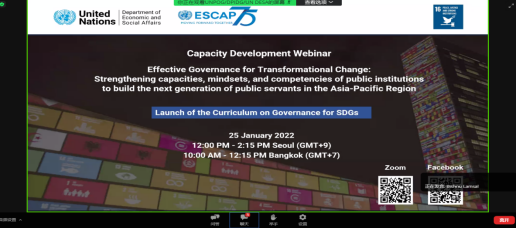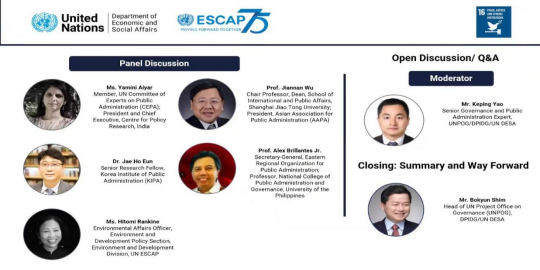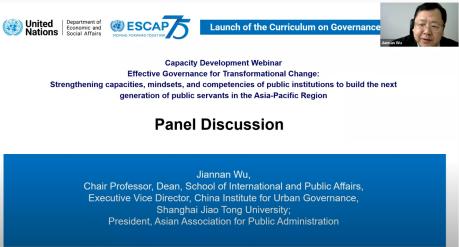AAPA President Jiannan Wu attended the “Capacity Development Webinar to Launch the Curriculum on Governance for the SDGs in the Asia-Pacific Region”Organized by the UNDESA, DPIDG and UN ESCAP
On January 25, 2022, the United Nations Department of Economic and Social Affairs (UNDESA), through its Division for Public Institutions and Digital Government (DPIDG), in collaboration with the United Nations Economic and Social Commission for Asia and the Pacific (UNESCAP), has organized a regional capacity development webinar to launch the Curriculum on Governance for the Sustainable Development Goals (SDGs) (the“Curriculum”) in the Asia-Pacific region. The theme of this webinar is “Effective Governance for Transformational Change: Strengthening capacities, mindsets, and competencies of public institutions to build the next generation of public servants in the Asia-Pacific Region. Invited by the UNDESA DPIDG, Professor Jiannan Wu, President of the Asian Association of Public Administration (AAPA), Dean of the School of International and Public Affairs, and Executive Vice Director of the China Academy of Urban Governance of Shanghai Jiao Tong University attended the webinar as a panelist. More than 1,100 people from more than 100 countries registered for the seminar.
The target audience of the Webinar includes schools of public administration and institutes of public management in the Asia-Pacific region, members of the United Nations Public Administration Network(UNPAN) and the UN Resident Coordinator Offices in the Asia-Pacific region. The Webinar is also open to the public upon registration.


The Webinar was hosted by UN officer Ms. Mi Kyoung Park, Head of UNPOG, DPIDG/UNDESA, Mr. Bokyun Shim and Chief, Environment and Development Policy Section, Environment and Development Division, UN ESCAP, Ms. Katinka Weinberger delivered the opening remarks。Ms. Adriana Alberti, Chief, Programme Management and Capacity Development Unit, DPIDG/UN DESA, first gave an overview Introduction of the Curriculum and then took a brief journey through the first 4 Toolkits. Mr. Bokyun Shim then introduced the following 3 Toolkits. , first introduced the 11 Principles of Effective Governance for Sustainable Development, proposed by the CEPA. She then introduced the Indian government’s responses to COVID-19 and emphasized the importance of local government.
Professor Jiannan Wu, representing the Asian Association of Public Administration (AAPA), the School of International and Public Affairs, and the China Institute for Urban Governance of Shanghai Jiao Tong University joined the panel discussion. He stated that it is right time to launch the curriculum. It has been 7 years since all member states of the United Nations agreed to adopt the 2030 Agenda, including the recent 2 years of pandemic. More Wicked Problems comes out more often and need solutions, which can be developed based on learning the Curriculum. Now different country may have different policy issues, in which policy implementation should be one of important issues. The curriculum can be promoted by stakeholders working together through Different Channels: 1. Government; 2.NGOs; 3.Academic Communities (AAPA); 4. Enterprises. The Curriculum needs to be studied and translated. In each public administration school, Undergraduate, Master and Doctoral Students can be taught based on the current learning system, e.g. research methods. He also mentioned thta AAPA is planning to work together with other societies and association to hold some seminar, workshops and conference to deepen the understanding of the curriculum.

Subsequently, Representatives from UN Committee of Experts on Public Administration (CEPA), President and Chief Executive, Centre for Policy Research, India, Ms. Yamini Aiyar, the Korean Institute of Public Administration, Professor Jaeho Eun, Eastern Regional Organization for Public Administration and the University of the Philippines, Professor Alex Brillantes , and Environmental Affairs Officer, Environment and Development Policy Section, Environment and Development Division, UN ESCAP, Ms. Hitomi Rankine, respectively, presented their discussions on the Curriculum; Representatives of Bhutan, Nepal, Indonesia, Cambodia, Fiji, Sri Lanka and other countries also commented on the Curriculum, among which Professor Agus Pramusinto, Professor of University of Gadjah Mada in Indonesia, Member of the Indonesian Civil Service Commission and Secretary General of AAPA, stressed the importance of maintaining policy continuity between central and local governments at all levels of government in Indonesia, and how to maintain sustainable innovation. The webinar was closed by Mr. Bokyun Shim.
The Curriculum, which is a holistic and integrated framework, translates the 11 Principles of Effective Governance into practice through capacity development training material on governance and public institutions. It aims to promote critical understanding of sustainable development issues, enhance governance capacity, and strengthen public servants' awareness of their active role in contributing to the achievement of the SDGs. The Curriculum is a comprehensive set of Training of Trainers Capacity Development Toolkits, which contain ready-to-use and customizable training material on key governance dimensions needed to advance the implementation of the SDGs. More detailed information of the Curriculum: https://unpan.un.org/capacity-development/curriculum-on-governance-for-the-SDGs



